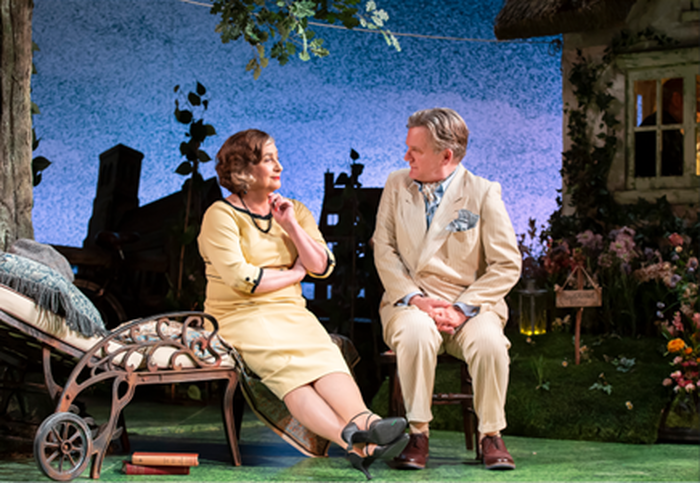‘An Ideal Husband’ – The Wilde production that refuses to let ‘one’s past’ be ‘what one is’
Transplanted to a culture closer to our own, ‘An Ideal Husband’ allows its audience a glimpse into the darker side of human nature

Oscar Wilde’s writing is easy to fumble. In a play that hinges on witty wordplay and irony-drenched barbs, the cast of An Ideal Husband has done well to keep the pace rapid and the audience hooked for almost two hours of epigrams, upper-class catfights, and morality battles, racing through dialogue that has been written to ensnare. Though off to a slightly jarring start, nailing the pacing was something the actors had to ease into, the first interactions feeling self-conscious in their performance — a self-consciousness that quickly fell away as the cast sank into their roles and the well-positioned couch that its aristocrats drape themselves across to conduct their illicit conversations.
“We are caught in the crossfire of an ethical explosion”
An Ideal Husband is a play about public scandal, where politician Robert Chiltern must prevent his earnest — if morally intolerant — wife from discovering he has built a career from selling government secrets, a fact the serpentine Mrs Cheveley has discovered and intends to put to dangerous use by manipulating his position of power to endorse a clearly fraudulent scheme. Though centred around reputation, it is the intimate duologues that charged the stage. Mrs Cheveley (Alice Roberts) in her platform boots and decadent fur coat became a force that could believably blackmail, cheat, and seduce, right down to the red lip and cat eye glasses, by far the most cohesively costumed on stage. Coupled with deft pacing and pointed fingers, Mrs Cheveley was an alluring physical threat that almost made the audience wish for her victory so we could see more of her in the final act.
Squaring off against her, Alessandra Rey’s Lady Chiltern could have wilted into a dull, pious archetype, but Rey gave her character an authentic naivety that felt truly pitiable — her cry that “circumstances should never alter principles” seems sadly out of place in the cutthroat world her husband has found himself caught in. Even when mute, she drew the eye; we cannot help but watch as Lady Chiltern meticulously rearranged the ornaments in her house while other characters took centre stage.
It was these paired dynamics that allowed Wilde’s biting, nimble lines to sing — interchanges like “I never change” “Why, then you have learned nothing?” sharpen under the vivid multi-coloured stage light to something more than an argument; we are caught in the crossfire of an ethical explosion that is only occasionally deflated by the slightly bizarre choice of upbeat music that fills the transitions between acts.
“This adaptation creates interesting potential for audience understanding”
An Ideal Husband does not deal solely with the knife edge of human corruption. Despite its stage having only a singular door, the play pulls off a multiple-room farce sequence to striking effect, as clever direction has made use of the stage space to create fluid, moving character shifts complete with slamming doors and dramatic exits. Will Irngartinger’s Lord Goring steals laughs as the ever-insouciant dandy mimes and gestures wildly in the background, taking unscripted asides with the audience that pull us into the unfolding comedic chaos as Aaron Kriegman’s Robert Chiltern’s accidental tendencies to lapse into melodrama here work in his favour to heighten the satire the actor has seemingly found himself amid.
The choice to transition a Victorian period satire to 1970s America is an unexpected one, and some elements of it fall flat. While details of international relations and political personalities can be edited without issue, snappy remarks about the state of women’s education and repressive feminine expectations become dead weight. But this adaptation creates interesting potential for audience understanding. We can recognise references now; when Goring tells us he “only reads playboy,” or we are informed that the “typical American” is “always dull and usually violent,” we find ourselves in on the joke, participating in Wilde’s razor-sharp social commentary that would otherwise have excluded us from the long-past 19th century England.
A play where “everyone turns out to be somebody else” should have the potentiality to metamorphose. As we watch relationships on the threshold of collapse, it feels poignant that the edited time period and boldly different aesthetic would run the risk of undoing itself, too. Here is a rendition of An Ideal Husband that is not afraid to try something new, and Wilde himself told us that ‘always’ is “dreadful word…a meaningless word, too.” There is no always here; the play refuses to remain within the bound of expected stasis and continuity. We are seeing the darkest parts of human interaction played out on a foreign stage, and it almost always manages to balance an impulse for comedy against the ominous reality of moral failure.
An Ideal Husband is playing at the Corpus Playrooms from Tuesday 2nd to Saturday 6th May, 7pm.
 Comment / Plastic pubs: the problem with Cambridge alehouses 5 January 2026
Comment / Plastic pubs: the problem with Cambridge alehouses 5 January 2026 News / Cambridge businesses concerned infrastructure delays will hurt growth5 January 2026
News / Cambridge businesses concerned infrastructure delays will hurt growth5 January 2026 News / New movement ‘Cambridge is Chopped’ launched to fight against hate crime7 January 2026
News / New movement ‘Cambridge is Chopped’ launched to fight against hate crime7 January 2026 News / AstraZeneca sues for £32 million over faulty construction at Cambridge Campus31 December 2025
News / AstraZeneca sues for £32 million over faulty construction at Cambridge Campus31 December 2025 Interviews / You don’t need to peak at Cambridge, says Robin Harding31 December 2025
Interviews / You don’t need to peak at Cambridge, says Robin Harding31 December 2025










